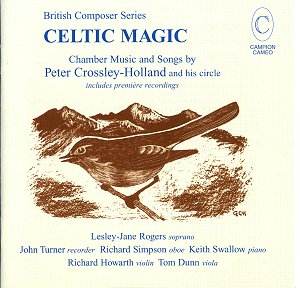An
astonishing and enlightening disc, consisting mainly of world
premières of music which project initiator/driving force
and "recorderist" par excellence John Turner has rather
self deprecatingly described as "byways". I could wax lyrical
about Turner's entertaining, illuminating and completely authoratitive
booklet notes (both about the music and its composers) but would
rather concentrate on the music itself, especially that of Peter
Crossley-Holland. He turned out to be an absolute musical (and
cultural) touchstone to this listener - Celtic, eastern and early
music influences abound, probably in that order of regularity/importance.
In addition he was a Wilmslow resident, as I currently am, half
a century ago - some of this music was composed here!
There
are at least three currently available (and relatively recently
recorded) versions of the Rubbra Oboe Sonata, including
this one. The latter is not found particularly wanting nor superior
alongside the Dutton and Hyperion/Helios efforts. Likewise the
Britten Metamorphoses is given a solid performance but
there are, again, quite a few alternative versions (Robin Canter
on the defunct Carlton Classics has my vote at present). Anyway,
these are not the main attractions, great though they are, of
a disc of almost maximum length and therefore still containing
getting on for an hour of hitherto virtually unknown but beautiful
music.
We
are treated to a couple of lovely songs by the very much (undeservedly)
neglected Julius Harrison. There are also more adventurous works
by John Manduell (a taut but emotional tribute to Crossley-Holland
for viola and violin duet) and David Cox (the classically inspired
vocal piece The Magical Island). There is an unusual version
of John Ireland's The Holy Boy for violin and piano. However,
this disc is mainly intended to illuminate key elements of Peter
Crossley-Holland's muse and it achieves its aim magnificently.
The Trio for recorder, oboe and viola is alone worth the
price of the disc. It is a superb piece of beautiful yet ambiguous
Celtic pastoralia. Tintagel and the Landes region of south-west
France are invoked in two of the five movements titles. Having
lived with this for a fortnight, I would say that it is at least
as good as any equivalent piece in VW, Finzi, Howells and with
the extra Celtic dimension. Describing its use of pentatonic and
modal themes and drones sounds like a cliché but the music
soars far, far beyond! This relatively early work sits very comfortably
alongside the almost as great Ode to Mananan. This lyrical
late piece for recorder and piano soon had me rooting for Emma
Christian's seminal Beneath the Twilight on my CD shelf
as a comparative listen for the Manx influence - authentic in
the extreme and eminently listenable with it, as it turns out!
That
leaves us with the songs, the most unforgettable of which come
in pairs. The first twins a setting of Hardy's glorious Weathers
with one of O'Sullivan's The Piper to great effect. Turner's
recorder adds a different aspect to the Two Songs - The
Philosopher Bird relates the tale of a gypsy's omniscient
pet sparrow in the words of Crossley-Holland's poet son Kevin.
The Fairy Workers has a similarly folkloric theme. At their
best (i.e. most of the time) these pieces are up there with the
Finzi of Garlands or Proud Songsters or Moeran's
late but life-enhancing settings of songs from County Kerry.
This
recording will be in my best three CDs of 2003. The Trio
contains some of the most perfect folk-influenced classical music
you are ever likely to hear (certainly this side of Milhaud or
Martinů). The rest is pretty fantastic too. An absolute must-buy
for anyone interested in British chamber music and songs written
during the last hundred years. For the performances, the recording
but above all the music - an absolute classic! Penguin Rosette
material I should hope!
Neil
Horner

